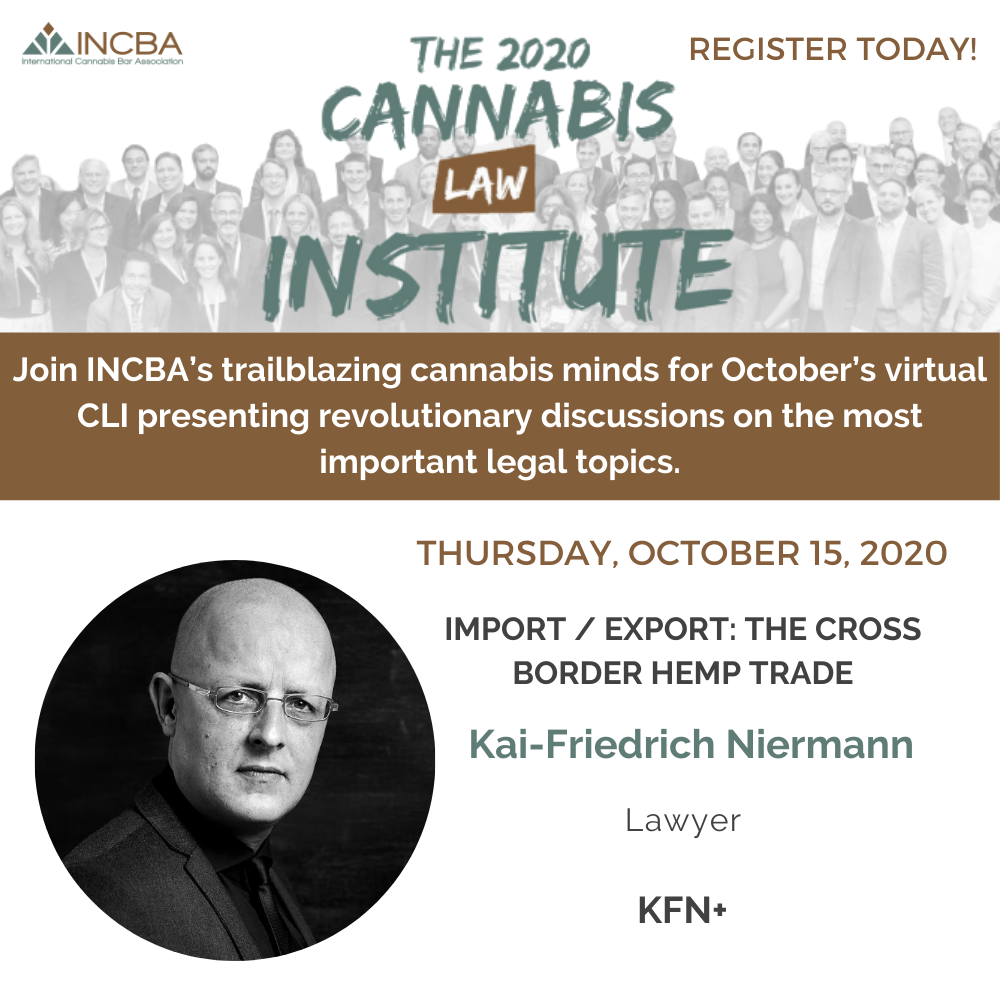I am looking forward to speaking at The Cannabis Law Institute 2020 for a day exploring International & Cross-Border Issues related to Cannabis Law taking place Thursday, Oct. 15th from the comfort of your home office. Register here: with code NIER15 in order to receive 15% off and join us for this month-long exploration of Cannabis Legalization.
International Cross-Border Markets, 15th of October 2020, Track Chairs: Kai-Friedrich Niermann, Lawyer, KFN+
The historic designation of cannabis as a restricted substance by the UN under the Single Convention on Narcotics has, from the middle of the 20th century until recently, preclude commercial international cannabis trade. But with renewed interest in the hemp industry and the popularity of CBD products, global trade is the future. And it’s not just CBD and hemp as the cannabis plant keeps delivering the discovery of novel cannabinoids and researchers and the private sector continue to identify the health benefits of the psychoactive properties of cannabis and explore other cannabinoids and their impact on health outcomes and commercial products. This track explores the cross border hemp trade and the future of THC and non-THC cannabinoids in a global marketplace.
Opening Keynote with Pavel Patcha on Inter Se Modification
Domestic regulatory progress is required to create vibrant cannabis markets – but what about our international obligations and running afoul of our treaty obligations. The UN Single Convention on Narcotics governs permissible domestic regulation, and certain counties, like Canada, have breached those obligations by implementing an adult use market. Here in the US – our own government argues we remain compliant because the federal government continues to prohibit cannabis – while the rest of the world recognizes we fell out of compliance as soon as Washington State passed the first adult use regime in the US.
But what are the consequences of non-compliance, and how can we fix it? Enter Pavel Patcha – with decades of experience with the International Narcotics Control Board, hear from one of the premier experts in the world on the process of inter-se modification – whereby a member country can give notice of withdrawal from the single convention, and rejoin absent the provisions prohibiting cannabis.
Session 1
Import/Export: The Cross-Border Hemp Trade
Hemp is making its way around the world. As the industrial component of the Cannabis Sativa L. plant, hemp has benefited from the lower set of regulatory strictures as compared to psychoactive cannabis. The import and export of hemp to and from the European Union has become common, and the CBD markets are maturing. Take a look at the legal hemp trade, how biomass is moving, and what import and retail of cbd looks like around the world.
Panelists:
Bob Hoban – President of Hoban Law Group and Hemp Entrepreneur
Lorenza Romanese – Managing director of the European Industrial Hemp Association (EIHA)
David Wenger – General Counsel of Asia Horizon Group, Cannabis investor, US Senate/House Cannabis Working Groups member
Evelyn van Keymeulen – Lawyer (Allen & Overy), leading the most import cannabis case in 2020 before the European Court of Justice
Kai-Friedrich Niermann – Lawyer and founder (KFN+ Law Office), European Cannabis consultant, Moderator
Legal Trafficking – The global THC supply chain of the future
Session 2
This panel will reflect on the future trade of THC products and how such trade can function without between countries, above and beyond the existing Single Convention. We see that besides Canada and Uruguay, other countries are on the starting blocks to fundamentally change their cannabis policies. Apart from the USA, next year’s change of cannabis policy could include Germany, as there are federal elections and a new government will be highly likely. Luxembourg has already decided on legalization and New Zealand is holding a referendum on it in November this year. Not in every case the local demand will be covered by local cultivation. Domestic cultivation is not even sensible from an environmental point of view, as too much energy is consumed in northern regions. In Germany alone, the demand for dried flowers from a legal and regulated export market is estimated with 500-600 tons. If new and modern products like Vape-Pens, Edibles and Beverages are developed, some countries and regions already have a know-how advantage which predestines them for the export of the products. This session will look at how an international supply chain for recreational cannabis products can be designed and how the enormous demand for products from legal markets can be satisfied. What conditions need to be created at the level of international law to make global trade possible? And what about import duties, safety standards and Intellectual Property?
Panelists:
Jason Moscovici – Canada, Moderator
Fabiana Penades – Uruguay (tbc)
John Walsh – USA
Kai-Friedrich Niermann – Germany
Simon Rowell, New Zealand

